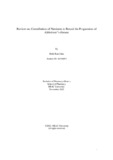Review on: Contribution of nutrients to retard the progression of Alzheimer’s disease

View/Open
Date
2022-11Publisher
Brac UniversityAuthor
Saha, Bithi RaniMetadata
Show full item recordAbstract
In neurology, Alzheimer's disease represents greatest unmet medical need. Formation of
neurofibrillary tangles, Amyloid Beta-peptide (Aβ) deposition, and significant oxidative
stress, synapse loss are features of the brain in alzheimer's disease. Although current
treatments lessen symptoms, they do not dramatically change how the disease develops.
However, a number of strategies to halt the progression of the disease have moved to clinical
trials in recent years. The most sophisticated of these focus on amyloid-peptide and tau
protein and clearance, reducing oxidative stress which is a hallmark of alzheimer's disease
and is thought to contribute to the development of disease. At this moment, Pharmacological
treatments for alzheimer's disease are just partial inhibitors rather than curative. Therefore,
nonpharmacological therapies may be essential to halting or delaying the onset of the illness;
diet in this contextis validated by a substantial amount of research. In this review, some
theoretical and practical ideas regarding significance of nutrition to cure alzheimer's disease
have been analyzed.
